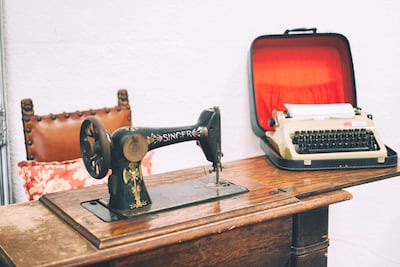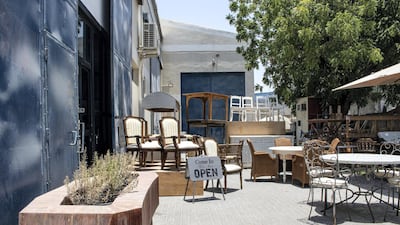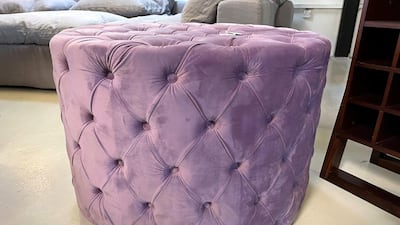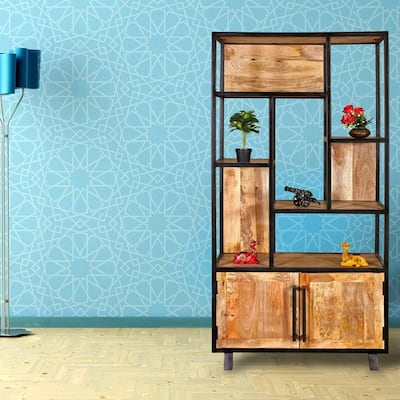Most high-street and high-end furniture stores in the UAE have a strong mall and online presence, so buying pieces is just a few steps or clicks away.
However, a series of new enterprises – with a focus on all things old – are urging residents to rethink the way they curate their homes.
La Brocante: pop-ups for pre-loved furniture
Kitschy community space La Brocante launched in Dubai at the end of 2020, giving residents access to a vast collection of high-end, vintage and upcycled second-hand furniture.
The space, which translates as The Flea Market from French, holds bi-weekly pop-ups in Al Quoz, where people can sip on coffee from Loose Unicorns, check out work from local artists and get their hands on an eclectic range of pre-loved products.
A visit reveals a delightfully curious collection, including a coffee table made from an elephant saddle and a lacquered, hand-painted Chinese table. Elsewhere, antique-looking beds, lawn chairs, original film posters from the 1950s and Rajasthani chests of drawers are scattered around.
For a look at some of the products and their prices, scroll through the gallery above.
What the products do have in common is that they are all unique.
“We obviously have many different styles and designs, but it has to be something that is vintage, different and can last,” says founder Natasha Fownes.
“We have some brands, but a lot of the products here are one-of-a-kind pieces made decades ago that people have imported from their home countries when they moved to the UAE, but haven’t been able to take back.”
Starting La Brocante during the pandemic wasn’t a coincidence. The idea struck Fownes when several friends left the UAE in 2020, and needed to sell or store their furniture. As someone who has worked in film and live events, and has a warehouse in Al Quoz, Fownes decided to step in.
“We’ve now built our brand to the point where the public knows that they can sell unique products with us. People usually send us a photograph and we give them an offer. It’s a great way to create a circular economy.”
A piece retails for about 50 to 80 per cent of its original selling price, depending on its condition. La Brocante also rents items by the day for a percentage of their price.
“Art directors usually need unique pieces or props for shoots. Renting out furniture helps them cut down the cost, and it’s more sustainable than buying something new for just a few days of use.”
Sustainability and community are driving factors for Fownes, who grew up in Portobello Road, home to one of London’s most famous antiques market.
“For me, this way of buying – or conscious consumerism – is normal. And I have not really seen this in the furniture market here. I wanted to create that space.
"Dubai is a great city, a business hub. But it's so transient as well. People come for two or three years, so what's happening to the furniture they are purchasing? We need to be more conscious of it – it's up to us and we are all responsible," she says.
The reaction to the pop-ups are proof that there is a demand. “If you come here on the weekend, it’s like a little community. There’s a DJ, upcycled pieces, a mix of people, energy. It’s booming. You don’t get that when you walk into a [regular furniture] shop.”
Decosouq: selling second-hand furniture online
Fellow pre-loved furniture concept Decosouq also came into being in late 2020. According to its founder, Emir Tumen, the e-marketplace has grown month on month.
Decosouq works as an end-to-end platform, meaning it oversees the entire process. Sellers upload images of their second-hand products to the website, which allows them to then connect – and bargain – with buyers. Once a deal is struck, the buyer pays through Decosouq. Both the buyer and seller agree on a pick-up date, with the website's logistics team managing the assembly and delivery.
The buyer has 48 hours to confirm the product is authentic, after which the money is sent to the seller’s account. If there is additional damage, the buyer is given the option to return the product or ask for a bigger discount.
Thousands of people have been selling furniture during the pandemic, says Tumen. Decosouq's bestsellers include seating, dining and storage solutions. But this isn't the company's only source of business.
“We have had hundreds of small businesses and antiques dealers who could not open their showroom during the pandemic and had excess stock, so they started using Decosouq,” he says.
Tumen believes the pandemic has led to a thriving second-hand market for many reasons.
“The more people were at home, the more they were spending on refurbishment and home improvement. Since a lot of people started working from home or were home-schooling their children, there was an increase in demand for home office and school sets-ups.
“At the same time, not everyone could afford high-end brands. Considering the current situation, people were cautious about how they were spending, and would look for economical options. There are also a lot of people who are still not comfortable going to physical stores and are looking for digital solutions,” he says.
For those thinking about selling furniture online, Tumen recommends taking photos, preferably in daylight, that do the pieces justice, including details about damage to be respectful to buyers, and pricing items reasonably. The main idea, he says, is to rehome furniture, "not make money off it".
Kave: fixing and upcycling furniture
While there are new players advocating second-hand goods, home-grown concept Kave goes one step further – by making a case for not buying anything if it can be fixed or upcycled.
“The first question my mum would ask when getting rid of furniture is: has it really reached the end of its life? If the answer is no, why you are throwing it out? The precursor to upcycling is repair. Try to fix what you have,” says Rania Kanaan, who founded Kave with her sister, Zaina.
Kave is an expansion of their bicycle brand Charicycles, through which they design, customise and upcycle bike frames. To date, Charicycles has saved more than 1,500 kilograms of steel from landfill and donated more than 100 bicycles to children in refugee camps.

However, with bicycles being a seasonal business in Dubai, the sisters launched Kave in 2019 to keep the company sustainable. Today, it operates as a space where people can shop for fair trade products, learn how to upcycle through workshops and eat healthy, hearty food.
“Kave aims to tell the stories of things we buy so that we are more mindful of our consumption habits and the impact they have on the environment, the manufacturers and the communities beyond any one person’s reach,” says Kanaan.
The space practises what it preaches, with the cafe in Alserkal Avenue boasting furniture made from discarded wood and lighting made from glass bottles.

“Upcycling is a new concept worldwide … the idea is to change people’s perception. So, we presented something that is beautiful and once people liked it, we told them the backstory. That made any negative stereotype of used, sustainable and ‘old’ items vanish,” says Kanaan.
When asked about the benefits of fixing used products, she rattles off a slew of points.
“The furniture industry is one of the most polluting, least sustainable on the planet. By avoiding purchasing new items, you can reduce your ecological footprint significantly,” she says.
Buying or repurposing used furniture is less wasteful, helps prevent deforestation, limits plastic production and reduces carbon emissions, she says.
“Pre-loved furniture is economical and kinder to the environment. Just because something is no longer in front of you, it doesn’t mean it has disappeared. It is probably in a landfill somewhere hurting the environment.
"We often think that once something is in the garbage, it is no longer affecting us, but in reality, we all share this planet and waste will eventually pollute what you ingest. So be more aware and kind.”














